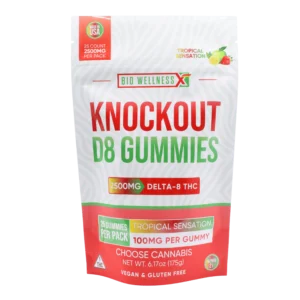Both Delta-8 tetrahydrocannabinol (THC) and Delta-9 THC have been subject to significant discussion due to their distinct psychoactive effects. As more individuals seek to experience the unique characteristics of each compound, a deeper analysis of the comparison of these two forms of THC is warranted. This article aims to provide a comprehensive overview of a Delta-8 high vs. Delta-9 high. We’ll dive into their respective highs, mental and physical health benefits, potential side effects, and methods of consumption.
With this knowledge at hand, individuals can confidently choose which compound meets their personal preferences or therapeutic needs. Furthermore, understanding proper dosing guidelines and storage practices will ensure consumers can safely obtain optimal results.
This article serves as a valuable resource for those eager to immerse themselves in the world of Delta-8 and Delta-9 THC. Let’s jump in and discern their unique offerings in an ever-evolving cannabis landscape.
Key Takeaways
- Delta-8 THC provides a milder high compared to Delta-9 THC. This makes it a preferred choice for those who want therapeutic benefits without intense psychoactive effects.
- Proper storage techniques are crucial for maintaining the quality and efficacy of delta-8 and delta-9 THC products. Proper storage can help maintain freshness, ensuring consistent effects and potency for future use.
- Delta-8 THC has anti-nausea, anti-anxiety, and chronic pain management properties. Conversely, Delta-9 THC is more commonly used for recreational purposes.
- Understanding the differences between Delta-8 and Delta-9 THC allows users to make informed decisions about which cannabinoid best suits their preferences and needs.
Delta-8 vs. Delta-9 THC: What’s the Difference?
The distinction between Delta-8 and Delta-9 THC lies in their potency, origin, and legal status.
A comparison of these two cannabinoids highlights the differences in their psychoactive effects and sources within the cannabis plant.
Furthermore, a discussion on the evolving legal landscape surrounding both compounds illuminates varying regulations across jurisdictions.
Which One is More Potent?
Comparing the potencies of Delta-8 THC and Delta-9 THC reveals notable differences in their effects on users. This comes with certain implications for those seeking specific outcomes or intensities. The two cannabinoids share a similar chemical structure, yet subtle variations between them lead to distinct psychoactive effects when consumed. Delta-8 is often described as providing a milder high compared to Delta-9, which is known for its more potent and intense effects.
To better understand the difference in potency between these two cannabinoids, consider the following table.
| Cannabinoid | Potency | Psychoactive Effects |
|---|---|---|
| Delta-8 THC | Milder | Mild body high, sedative, relaxing, and less anxious |
| Delta-9 THC | More potent | Intense, euphoric, potential for anxiety |
From this comparison table, it becomes evident that individuals can experience the difference between a Delta-8 high and a Delta-9 high. Those looking for a more manageable and functional experience may find solace in Delta-8’s milder nature. In contrast, individuals seeking stronger sensations might prefer the powerful intensity associated with a Delta-9 high.
Where Do Delta-8 and Delta-9 Originate?
The compounds’ origins reveal crucial insights into their unique properties, potential benefits, and applications in the world of cannabis.
Both cannabinoids are natural compounds found in the cannabis plant, which includes marijuana plants and hemp plants. These chemical constituents interact with our bodies’ endocannabinoid system by binding to cannabinoid receptors. This binding results in a range of physiological effects typically associated with a Delta-8 high or Delta-9 high.
While Delta-9 is more abundant in marijuana plants, Delta-8 occurs in smaller concentrations but can be extracted and concentrated for use.
It is important to note that while both cannabinoids derive from the same cannabis sativa plant, they have distinct biosynthetic pathways. Delta-9 THC predominantly originates from tetrahydrocannabinolic acid (THCA), which undergoes decarboxylation when exposed to heat or light over time. This process of decarboxylation forms the psychoactive compound we know as Delta-9 THC.
On the other hand, Delta-8 THC forms through a process called isomerization – where aged or degraded forms of Delta-9 THC convert into its less potent cousin: Delta-8 THC. This critical difference between their production processes contributes significantly to their varying levels of potency and overall experience.
The Legalities of Delta-8 and Delta-9 THC
Navigating the complex legal landscape surrounding Delta-8 and Delta-9 THC is essential for consumers in today’s market. As both compounds are found in varying concentrations within cannabis products, understanding their respective legal statuses can be challenging.
In the United States, federal law differentiates between these two cannabinoids based on their intoxicating effects. Marijuana is listed as a Schedule I controlled substance under the Controlled Substances Act due to its psychoactive properties. However, hemp-derived Delta-9 and Delta-8 THC occupy a more nuanced position. They’re not explicitly listed as controlled substances but fall under regulatory scrutiny due to their derivation from hemp. As long as they comply with certain regulations, hemp-derived compounds are technically legal at the federal level.
With the passage of the 2018 Farm Bill, hemp production became federally legal so long as it contains no more than 0.3% Delta-9 THC by weight. This legislation inadvertently created a loophole that allowed for the production and sale of Delta-8 THC extracted from legally compliant hemp plants. Consequently, many manufacturers began producing and distributing Delta-8 products across State lines.
However, individual State legislatures have begun enacting measures to restrict or regulate Delta-8 sales within their jurisdictions. As such, it is crucial for those involved in this burgeoning market segment to stay informed about evolving regulations. Keep yourself safe and in full compliance with the law while shopping for Delta-8 and Delta-9 products!
What Does a Delta-8 THC High Feel Like?
Examining the effects of a Delta-8 THC high reveals a unique and subtle experience. It is often described as clear-headed, focused, and mildly euphoric. This distinct sensation sets it apart from the more intense psychoactive effects typically associated with Delta-9 THC, the primary compound found in cannabis. The milder high offered by Delta-8 THC has sparked interest among consumers seeking an alternative to traditional cannabis experiences while still enjoying its therapeutic benefits.
- Reduced anxiety: Users report that a Delta-8 high tends to produce less anxiety compared to a Delta-9 high. This makes it an appealing option for those prone to feelings of stress or nervousness when consuming cannabis.
- Relaxing/Sedative: Delta-8 is known for its naturally sedative properties. Along with a euphoric body high, users report a peaceful and soothing experience.
- Deeper sleep: Along with that naturally sedative experience, Delta-8 can promote improved sleep quality and duration. Some users choose to combine Delta-8 with sedative cannabinoids like CBN for an even better night’s sleep.
- Mild euphoria: The Delta-8 THC experience offers a gentle sense of sedation and relaxation. This enables users to enjoy the positive aspects of cannabis while maintaining control over their cognitive functions.
In conclusion, those looking for a more manageable and balanced experience should consider giving Delta-8 THC products a try. They offer an opportunity to reap many therapeutic advantages without being subjected to overpowering psychoactive effects.
What Does a Delta-9 THC High Feel Like?
Exploring the sensations associated with a Delta-9 THC high reveals a more potent and immersive experience. One characterized by intense psychoactive effects that can elicit strong emotions and altered perceptions, distinguishing it from the milder Delta-8 THC counterpart.
The Delta-9 high often produces feelings of euphoria, heightened sensory awareness, and increased sociability. It is a more uplifting and energizing high, similar to a sativa-dominant hybrid. These distinct characteristics contribute to the overall difference in experience between Delta-8 and Delta-9 highs.
In this article section, it is important to note that while some individuals may find the Delta-9 THC high enjoyable and stimulating, others might be prone to experiencing anxiety or paranoia due to its potency. Consequently, those who are sensitive to the psychoactive effects of cannabis products should approach Delta-9 THC with caution. If you are looking for that extra kick, you might want to check out our Delta-9 THC products here.
Understanding these differences helps consumers make informed decisions about which type of THC high will best suit their desired experience. Today users can choose between a milder sensation provided by Delta-8 or the more intense experience associated with Delta-9.
What Are the Benefits of Hemp-Derived THC?
Hemp-derived THC offers several benefits as compared to its counterpart derived from cannabis plants with higher concentrations of Delta-9 THC. Some key advantages include the following.
- Legal accessibility: Since hemp-derived THC contains less than 0.3% Delta-9 THC, it is legal under federal law in many jurisdictions.
- Reduced anxiety: Delta-8 high often results in decreased anxiety levels due to its more subtle psychoactive properties.
- Enhanced focus: Users may find improved concentration and clarity while using hemp-derived THC products.
- Pain relief: Hemp-derived cannabinoids have been shown to possess analgesic properties that can help alleviate discomfort caused by various conditions.
- Antiemetic properties: Studies suggest that delta-8 THC may be effective in reducing nausea and vomiting associated with chemotherapy or other medical treatments. It may also stimulate appetite for those struggling with eating disorders or loss of appetite.
With an array of potential benefits ranging from reduced anxiety levels to pain relief, this alternative cannabinoid source proves advantageous for those who wish to harness the therapeutic properties of cannabis without experiencing adverse side effects.
Potential Side Effects of Delta-8 and Delta-9 THC
While both compounds can produce a high, there are significant differences in the intensity and duration of these psychoactive effects.
Delta-9 THC is well-known for its potent psychoactivity, often causing feelings of euphoria, altered perception, and increased appetite. However, it can also lead to anxiety, paranoia, dizziness, and impaired memory or coordination in some users.
On the other hand, Delta-8 THC has been reported to provide a milder high with a reduced likelihood of experiencing these negative side effects. Additionally, both Delta-8 THC and Delta-9 THC may cause physical adverse effects that users should be aware of when seeking to experience the difference between these two cannabinoids.
Some common side effects include dry mouth or ‘cottonmouth,’ red eyes due to blood vessel dilation within ocular tissue, and an increased heart rate which may cause discomfort for those with pre-existing cardiovascular conditions. It is worth noting that the severity of these side effects often varies depending on individual tolerance levels as well as the dosage taken. Lower doses typically result in fewer adverse reactions.
There are some methods to reducing risk of adverse events. These include choosing organic THC products, free from potentially harmful chemicals and practicing safe dosing.
How to Dose Delta-8 vs. Delta-9
To establish an effective dosage regimen for either compound, it is crucial first to consider factors such as body weight, metabolism, individual tolerance levels, and desired outcomes. For those new to cannabis use, it is advisable to start with low doses and gradually increase until achieving optimal results.
A common recommendation for beginners is 5-10 milligrams of either cannabinoid per dose. However, seasoned users may require higher amounts depending on their preferences and tolerances. It is vital to remember that the onset time for edibles can be significantly longer than inhalation methods (e.g., smoking or vaping). Patience and caution are necessary when adjusting dosages accordingly.
By employing proper dosing techniques for both Delta-8 and Delta-9 THC products, individuals can safely explore their distinctive properties and fully appreciate each compound’s unique benefits within the realm of cannabis therapy.
How to Choose the Right THC for You
Knowing individual preferences, desired outcomes, and potential side effects, all help to ensure a satisfying and therapeutic experience.
Users should first assess the medical benefits they seek from cannabis consumption, as well as their tolerance levels for psychoactive effects. For instance, if an individual is looking for mild relaxation or anti-anxiety properties without overwhelming psychoactivity, Delta-8 may be more suitable due to its lower potency compared to Delta-9. Users looking for improved sleep quality and duration may also find Delta-8’s sedative properties very useful.
When choosing the right THC variant for personal use, one must also take into account any negative side effects. Delta-9 is notorious for causing short-term memory impairment, increased heart rate, and anxiety or paranoia in some individuals. These adverse reactions are generally less pronounced with Delta-8 usage.
Furthermore, first-time users or those sensitive to cannabinoids might prefer starting with a lower-potency option like Delta-8 before exploring stronger alternatives such as Delta-9. Ultimately, understanding one’s own goals and limitations will make the right choice seem crystal clear. Moving forward, consumers should remain informed about the various properties of each cannabinoid will pave the way for an optimal cannabis experience tailored specifically around personal needs and preferences.
Where to Find the Best THC Products Online
In the quest to choose the right THC, it is essential to know where to find the best hemp-derived THC products online. With numerous Delta THC options available in today’s market, it can be overwhelming for consumers to navigate their way through countless online retailers. All of them are promising exceptional quality and efficacy, so it can get a bit murky.
As a result, understanding how to identify reputable sources of medical cannabis and hemp-derived products is crucial. This knowledge will enable individuals seeking natural relief from various health conditions to experience the difference between Delta-8 and Delta-9 highs with confidence.
One excellent source for high-quality cannabinoid products is BioWellnessX. Our company is dedicated not only to providing organic, gluten-free, non-GMO, and vegan alternatives but also ensuring that its offerings are free from artificial sweeteners, flavors, or dyes.
By adhering strictly to these principles and employing advanced extraction techniques in our product formulations, BioWellnessX has established itself as a trustworthy provider of clean and holistic wellness solutions that effectively address various health concerns. We make it possible for customers nationwide to benefit from premium cannabis products without compromising on quality or safety.
Final Thoughts: Delta-8 High vs Delta-9 High
In conclusion, the choice between delta-8 and delta-9 THC depends on an individual’s preferences and desired effects. While both cannabinoids exhibit psychoactive properties, they differ in terms of intensity and side effect profile.
Delta-8 is often considered a milder alternative to delta-9, offering a more clear-headed high with fewer adverse reactions.
As the legal landscape surrounding THC continues to evolve, consumers need to research before making informed decisions about their cannabinoid use. Identifying personal preferences and understanding the differences between these two compounds can help guide individuals toward the most suitable option for their needs.

Legal Disclaimer:
By reading this information presented, you agree to release the author of any liability that comes from using this data. This post contains no legal advice. Claims about cannabinoids have not yet been approved by the FDA. Read the full legal disclaimer here.
Other Articles About Delta-9 and Delta-8
- Microdosing Delta-9 THC: The Complete Guide
- Microdosing Delta-8 THC: The Full Guide
- Delta-8 vs Delta-10 for Pain
- Delta-8 Gummies for Sleep and How They Work
- How Long Does Delta-9 THC Stay In Your System
- Are THC Gummies Legal in 2023?
- What’s the Difference Between Delta-8 and Delta-9?
- Delta-9 THC Gummies for Energy: Do They Work?
- Delta-9 THC Gummies Review – The Best Legal THC Gummy!
- Organic 50mg Delta-8 Gummies: Benefits, Effects, And More!
References:
- Farm Bill- Hemp Production and the 2018 Farm Bill – 07/25/2019 | FDA
- Controlled Substances Act- The Controlled Substances Act (dea.gov)
- Mayo Clinic – CBD: Safe and Effective?
- National Institutes of Health: Cannabis and Cannabinoids: What You Need to Know
- Review of delta-8-tetrahydrocannabinol (Δ8 -THC): Comparative pharmacology with Δ9 -THC
- Consumer Experiences with Delta-8-THC
- Delta-8-THC: Delta-9-THC’s nicer younger sibling?
FAQs About Delta-8 THC and Delta-9 THC
Delta-8 THC and Delta-9 THC can be consumed concurrently, potentially resulting in amplified psychoactive effects, enhanced therapeutic benefits, or altered experiences. Further research is needed to fully understand this combined interaction.
Optimal activities and environments during Delta-8 or Delta-9 highs vary based on individual preferences. However, ensuring safety and comfort is paramount. Calm, familiar settings and low-risk activities are generally advisable.
The experiences of Delta-8 and Delta-9 THC differ among individuals with varying cannabis experience, as first-time users may report milder effects while regular users might discern subtler distinctions between the two.
Limited research exists on drug interactions between Delta-8 or Delta-9 THC and prescription medications or over-the-counter supplements. Caution is advised when combining these substances until further studies elucidate potential interactions.
Unfortunately, Delta-8 and Delta-9 are so similar that most drug tests will pick up on Delta-8 and other synthetic cannabinoids. For those subject to testing, we recommend zero-THC options like broad-spectrum CBD oil or CBD isolate.











